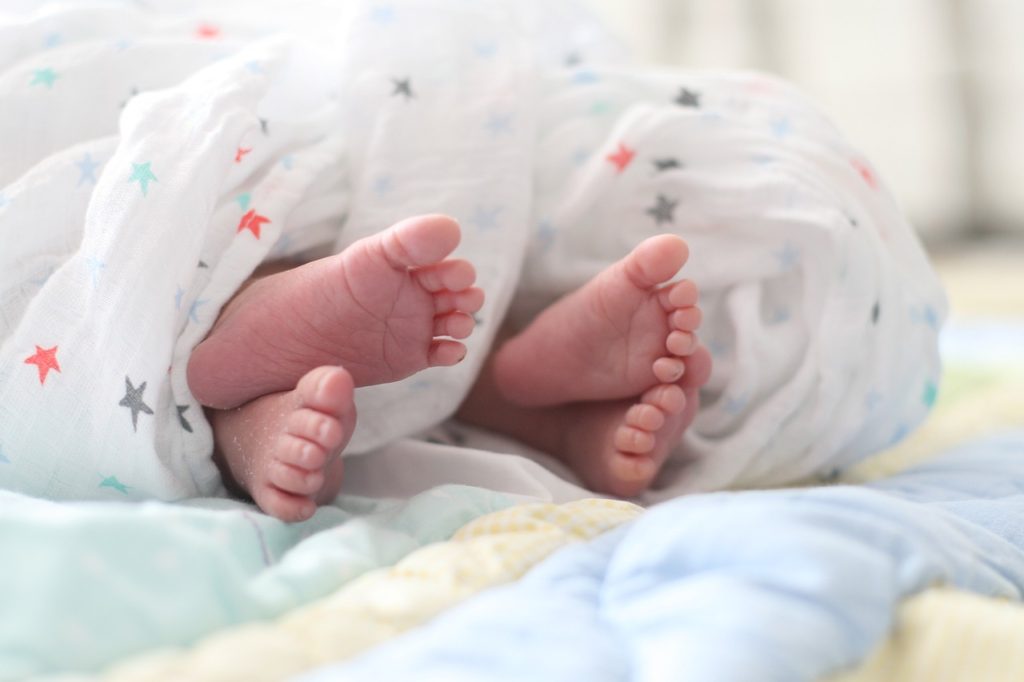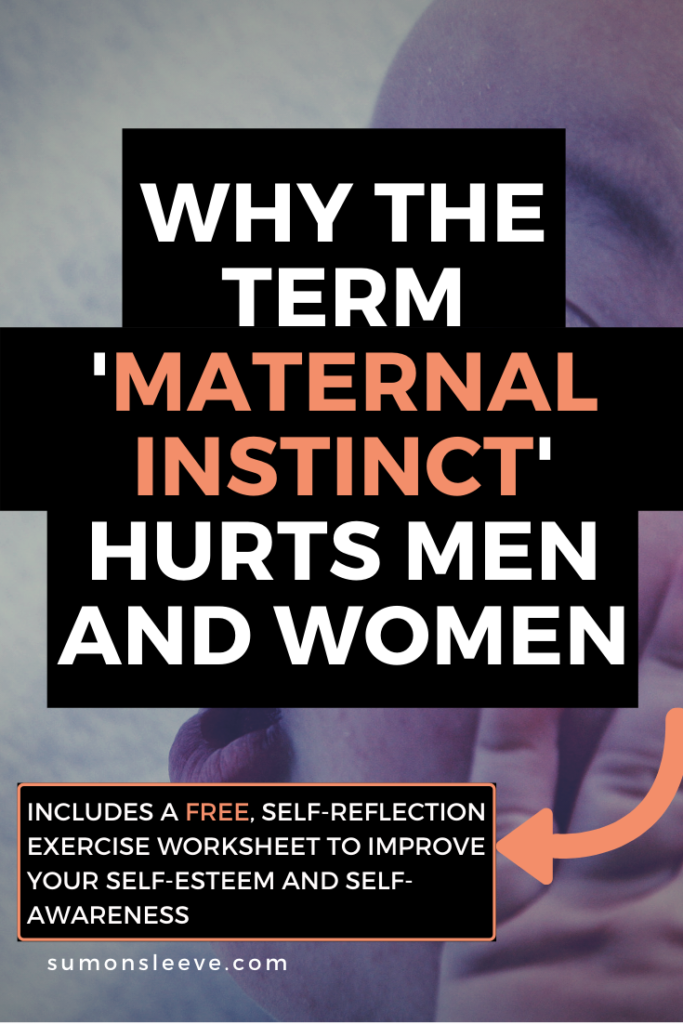Because women aren’t the only ones who can be nurturing human beings. Duh!

Let’s time travel back to about 3 years ago.
It’s 3:00 am. My daughter’s hunger cries wake me up. I get up, trudge over to her crib, pick her up and yawn.
It’s 3:05 am. I’m sitting in my bed with my pink nursing pillow. She’s feeding voraciously. She finishes. I burp and change her. She’s in milk drunk heaven, peacefully sleeping like an angel in her crib. I lie awake, staring at the ceiling. I glance over at the clock.
It’s 4:00 am. I hear my daughter’s big sigh as she settles into a more comfortable sleeping position. I look down at my husband. He hasn’t moved an inch. I frown at him, rolling my eyes, curling my lip as jealousy and resentment continue to pollute our marriage.
It’s 6:00 am. The house is as quiet as a mouse. I can hear a fucking pin drop. I’m starting to drift off to sleep.
It’s 6:30 am. The iPhone alarm goes off. My husband finally moves. He turns to me,
“Wow, I think she slept through the night.“
My jaw drops. My eyes roll. My head shakes.
A lot has changed since then.
My husband changed careers. He left the 9-5 to become a realtor; he’s at home during the day and works more evenings and weekends. He’s not a slave to the 6:30 am alarm.
Our son was born. And he’s bottle-fed which meant my husband and I both take turns doing the night feeds.
My husband also started snoring so I now wear earplugs to bed and we sleep with our heads at opposite ends of the bed.
Now let’s fast forward to last night.
It’s 3:00 am. I’m sleeping. I hear my son cry despite my powerful earplugs. I’m about to get up when my husband starts shifting around. He’s moving! I wait for 30 seconds. He gets up and goes to the crib. He grabs a bottle, picks up our son, and feeds him.
It’s 3:05 am. I fall asleep to his milk gulping sounds.
It’s 3:15 am. I’m sleeping.
It’s 6:30 am. I wake up. I go downstairs. My husband’s standing in the kitchen; he sees me and says,
“I don’t know why but I couldn’t sleep after I fed him.”
I gloat,
“That’s your “maternal instinct” kicking in.”
Science proves both men and women have caregiving instincts
Hormone changes in new dads
It’s well-known that women go through a slew of hormonal changes from pregnancy, childbirth to postpartum; however, men also undergo hormone changes when they become fathers.
You know that feeling you get when you snuggle with a baby and you get all warm and fuzzy inside?
That’s oxytocin, commonly referred to as the ‘love hormone’. A study showed that a burst of oxytocin is released in both moms and dads whenever they engaged with their babies, cultivating the bond and increasing empathy between the caregivers and the child.
Basically, it’s a positive feedback loop where the more you cuddle with your baby, the more you want to cuddle with your baby because it feels good, regardless of gender.
Estrogen isn’t only present in females. A surge of estradiol (a form of estrogen) occurs in new dads, promoting caring and nurturing behaviours.
Another study showed that an influx of prolactin, the hormone responsible for lactation in mothers, is also released in new dads. The increased prolactin levels in fathers trigger an emotional response whenever their infant cries.
Brain changes in new dads
In a 2014 study, it showed that when fathers spent time with their newborns, their brains physically changed. New neurons (specialized cells that transmit signals to other cells) were created, specifically in the areas of the brain associated with nurturing, empathy and attachment.
I always thought moms were biologically more prone to worrying about their offspring than dads. Like last night…when I heard my son laugh in his sleep, I immediately had to Google it to confirm that it’s a completely normal thing.
It’s true because the surge of hormones women experience from becoming mothers activates their amygdalas, the part of the brain that’s home to emotions. And that activation is permanent which means we will always and forever worry about our children.
However, this can also occur in men. In a study that looked at gay fathers where there was no female caregiver present, the same amygdala activation occurred in the men.
Hence, it doesn’t matter what gender a primary caregiver is; the connection to our children is developed through commitment, engagement, love and care.
Changing gender stereotypes and outdated social expectations
Although science has proven that men also undergo biological changes as they become fathers, society has not caught up and this detrimentally affects both men and women. It stems from the way we were raised, cultural and environmental factors and of course, the media.
And I’m an unknowing contributor to and a product of those gender stereotypes. When I first heard the term “maternal instinct,” I didn’t care much about it.
Yes, the power of ‘mother’ nature, motherhood, womenhood and sisterhood!
Yes, the cumulation of our ancestors, great grandmothers, grandmothers, aunts, mothers, sisters, generations upon generations of childrearing experience ingrained in our DNA, hearts and minds.
Yes, pregnancy, labour, giving birth, breastfeeding!
Yes, women are gentle, soft, emotional and social beings!
Yes, women are warm, empathetic and caring creatures!
Yes, women connect with other women about their feelings!
So, it’s natural for us to be caregivers right?
But what does that do a woman? How does that influence the expectations she puts on herself? What about the expectations that society puts on her?
What does that do to a man? How does that influence the expectations he puts on himself? What about the expectations that society puts on him?
For instance, you have a group of coworkers (men and women, some are parents, some are not) when a mother brings her baby in. The mother has to go to the loo.
Who does she hand her baby off to?
If you were the mother, who would you hand your baby to?
I cringe as I am writing this but I see another woman.
And to be brutally honest, as a mother, I would hand my baby to another parent, preferably a mother over a father. (And I thought I was a feminist…SMH.)
These subtle assumptions in our day-to-day interactions are what keeps us using the words, “Maternal Instinct.”
Women will continue to be the default primary caregiver and society will expect her to be so.
New mothers will have unrealistic expectations for themselves
New mothers will expect themselves to know everything, to be “naturally loving”, to be “better caregivers,” because they’re biologically wired for the role.
It will keep making us question ourselves and our abilities as a mother,
“Why the fuck is motherhood so hard if it’s in our instincts?”
“Isn’t this supposed to be this innate to us?”
“We must be doing it wrong.”
An unfair choice for women to have or to not have children
For women who have yet to decide whether they want children, it makes the choice extra difficult.
Do I want children because it’s in my biology?
Or do I want children because of what society expects me to do?
Or do I want children because that’s just what I want?
It places a sexist expectation on women who choose not to bear children. It’s like,
“What about your maternal instincts? You’re rejecting the gifts you can offer to the world as a woman.”
“Don’t you have a yearning, a burning desire to populate that uterus with what you’re genetically predisposed to do?”
It stunts the opportunity for fathers to flourish in their roles
Before you read on, I’m generalizing men; I know there are always exceptions to the rule and obviously, not all men are the same.
Times have changed. Men are doing a lot as fathers, from changing diapers, feeding, burping, cuddling, bathing, playing etc. There are more stay-at-home dads than there have ever been, although this number is still relatively low compared to fathers who work outside the home.
However, it’s not about how much a parent does that determines how much they care about their children. It’s based upon how they value what they can offer to their family that they hold themselves against.
A father can do half or even more of the parenting duties than a mother but value it less than providing financially to the household. It’s still a numbers game for men. It’s bringing home the bacon, being the breadwinner that society expects men to do. And those expectations shape men’s values as they become fathers.
They grow up inherently believing that the role of the caregiver defaults to the person who has “maternal instincts”, that the mother of their child is the “better parent”.
“Why try to be good at something I wasn’t born to do?
I was born to hunt, to bring food to the table, to provide and maintain shelter for my family. The more I can do this, the more value I am offering and the more valued I am as a father.“
Marriages with children are riddled with resentment
In the Chinese language, there’s a saying called, “無得救” which means “no salvation” or “it’s not salvageable.” And that’s how I feel about trying change to the values of the current generation of parents. It’s not possible to rewrite history; what’s done is done.
In many societies, it’s socially acceptable for mothers to be the breadwinners, to have opportunities to own businesses, to rise up in their careers, to provide financially for their families. It’s socially acceptable for mothers to also do the childcare, the pick-ups, the drop-offs, the playdates, the lunches, the scheduling, the extracurriculars, the tough conversations, the emotional support etc.
Women value both their financial and caregiving contributions to the family. The efforts they put into one area is just as meaningful as the efforts they put into another area (which unfortunately creates an internal battle of working mom guilt). Women are trying to live up to their maternal instincts and take advantage of this day in age.
“If I can do both, I should do both and I should do both of them well. I should be grateful I have the choice. I should seize the opportunity to do this.“
“Nothing is holding us back now…it’s time to shine and make our female ancestors proud!“
However, men view this differently. Social expectations have not changed for them. They prioritize financial contributions to the home more. And this difference in values between husbands and wives is what causes resentment.
When mothers see their husbands not living up to the expectations they hold for themselves, the fairness principle kicks in.
“It’s not fair! I will always do more because I care more. Because I want to do more. He will always do less because he expects less and doesn’t feel guilty for doing less.”
And the nagging starts, then bickering, resentment brews, arguments repeat, households divide, separations occur and divorces ensue.
It’s an uphill internal battle for men.
As men engage with their children more, their biology changes and the more they’ll realize and appreciate their paternal instincts, activating their desire to be the primary caregiver; however, their sense of self-worth as fathers will still depend on how much they can contribute financially to the family.
It’s an uphill battle for men, suppressing their interest to emotionally connect with their children because they weren’t born with “maternal instincts”, internalizing their need to be the one who pays the bills, and constantly disappointing themselves for never meeting their wives’ expectations.
Therefore, it’s time to stop saying “maternal instinct” and instead, call it our “human instinct” to love, nurture and care for the children in this world.
So Readers, how do you think society will evolve as more men become primary caregivers?





